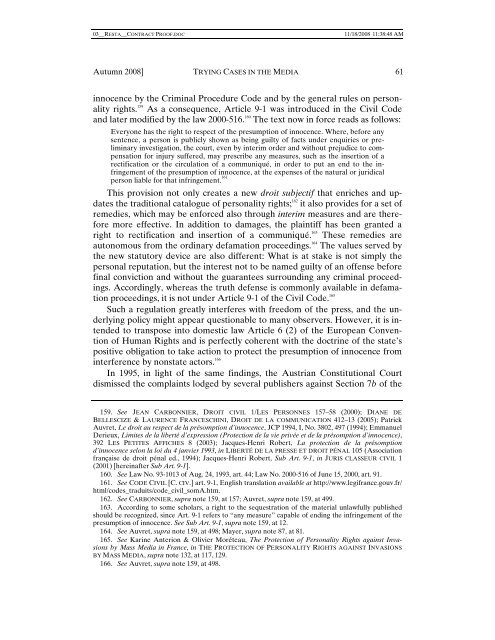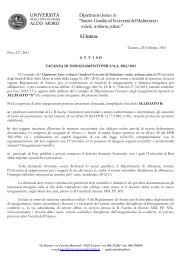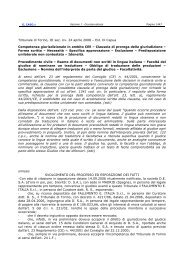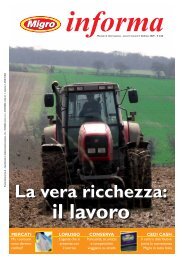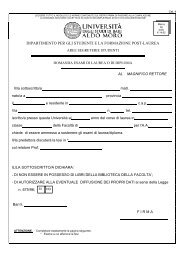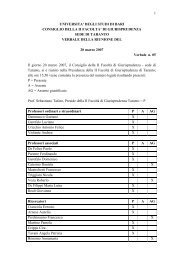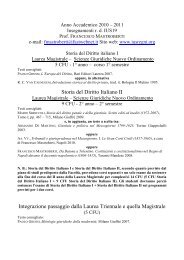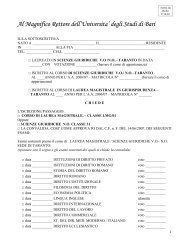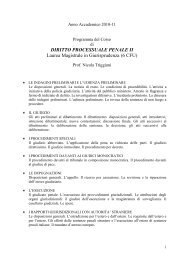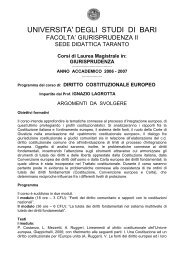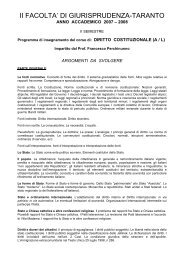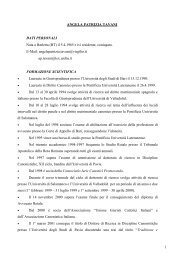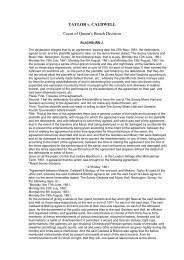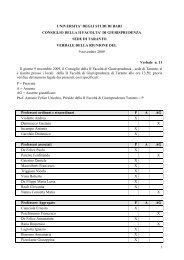TRYING CASES IN THE MEDIA: A COMPARATIVE OVERVIEW
TRYING CASES IN THE MEDIA: A COMPARATIVE OVERVIEW
TRYING CASES IN THE MEDIA: A COMPARATIVE OVERVIEW
You also want an ePaper? Increase the reach of your titles
YUMPU automatically turns print PDFs into web optimized ePapers that Google loves.
03__RESTA__CONTRACT PROOF.DOC11/18/2008 11:38:48 AMAutumn 2008] <strong>TRY<strong>IN</strong>G</strong> <strong>CASES</strong> <strong>IN</strong> <strong>THE</strong> <strong>MEDIA</strong> 61innocence by the Criminal Procedure Code and by the general rules on personalityrights. 159As a consequence, Article 9-1 was introduced in the Civil Codeand later modified by the law 2000-516. 160 The text now in force reads as follows:Everyone has the right to respect of the presumption of innocence. Where, before anysentence, a person is publicly shown as being guilty of facts under enquiries or preliminaryinvestigation, the court, even by interim order and without prejudice to compensationfor injury suffered, may prescribe any measures, such as the insertion of arectification or the circulation of a communiqué, in order to put an end to the infringementof the presumption of innocence, at the expenses of the natural or juridicalperson liable for that infringement. 161This provision not only creates a new droit subjectif that enriches and updatesthe traditional catalogue of personality rights; 162 it also provides for a set ofremedies, which may be enforced also through interim measures and are thereforemore effective. In addition to damages, the plaintiff has been granted aright to rectification and insertion of a communiqué. 163These remedies areautonomous from the ordinary defamation proceedings. 164 The values served bythe new statutory device are also different: What is at stake is not simply thepersonal reputation, but the interest not to be named guilty of an offense beforefinal conviction and without the guarantees surrounding any criminal proceedings.Accordingly, whereas the truth defense is commonly available in defamationproceedings, it is not under Article 9-1 of the Civil Code. 165Such a regulation greatly interferes with freedom of the press, and the underlyingpolicy might appear questionable to many observers. However, it is intendedto transpose into domestic law Article 6 (2) of the European Conventionof Human Rights and is perfectly coherent with the doctrine of the state’spositive obligation to take action to protect the presumption of innocence frominterference by nonstate actors. 166In 1995, in light of the same findings, the Austrian Constitutional Courtdismissed the complaints lodged by several publishers against Section 7b of the159. See JEAN CARBONNIER, DROIT CIVIL 1/LES PERSONNES 157–58 (2000); DIANE DEBELLESCIZE & LAURENCE FRANCESCH<strong>IN</strong>I, DROIT DE LA COMMUNICATION 412–13 (2005); PatrickAuvret, Le droit au respect de la présomption d’innocence, JCP 1994, I, No. 3802, 497 (1994); EmmanuelDerieux, Limites de la liberté d’expression (Protection de la vie privée et de la présomption d’innocence),392 LES PETITES AFFICHES 8 (2003); Jacques-Henri Robert, La protection de la présomptiond’innocence selon la loi du 4 janvier 1993, in LIBERTÉ DE LA PRESSE ET DROIT PÉNAL 105 (Associationfrançaise de droit pénal ed., 1994); Jacques-Henri Robert, Sub Art. 9-1, in JURIS CLASSEUR CIVIL 1(2001) [hereinafter Sub Art. 9-1].160. See Law No. 93-1013 of Aug. 24, 1993, art. 44; Law No. 2000-516 of June 15, 2000, art. 91.161. See CODE CIVIL [C. CIV.] art. 9-1, English translation available at http://www.legifrance.gouv.fr/html/codes_traduits/code_civil_somA.htm.162. See CARBONNIER, supra note 159, at 157; Auvret, supra note 159, at 499.163. According to some scholars, a right to the sequestration of the material unlawfully publishedshould be recognized, since Art. 9-1 refers to “any measure” capable of ending the infringement of thepresumption of innocence. See Sub Art. 9-1, supra note 159, at 12.164. See Auvret, supra note 159, at 498; Mayer, supra note 87, at 81.165. See Karine Anterion & Olivier Moréteau, The Protection of Personality Rights against Invasionsby Mass Media in France, in <strong>THE</strong> PROTECTION OF PERSONALITY RIGHTS AGA<strong>IN</strong>ST <strong>IN</strong>VASIONSBY MASS <strong>MEDIA</strong>, supra note 132, at 117, 129.166. See Auvret, supra note 159, at 498.


